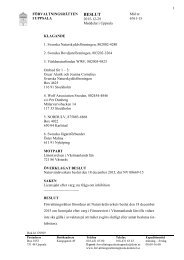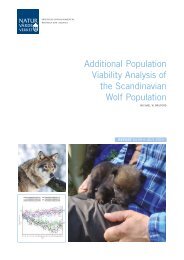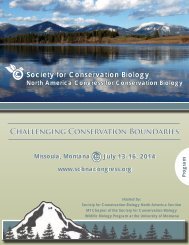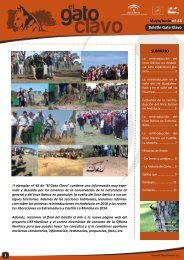1oC3Dbk
1oC3Dbk
1oC3Dbk
Create successful ePaper yourself
Turn your PDF publications into a flip-book with our unique Google optimized e-Paper software.
Deer Specialist Group<br />
The mission of the Deer Specialist Group is to contribute to<br />
biodiversity conservation through the improvement of the<br />
welfare and sustainability of deer populations around the world.<br />
One of our main tasks for the next period will be to assess<br />
the 71 deer species as part of the Global Mammal<br />
Assessment. We started the quadrennium (2013–2016) by<br />
appointing our membership and organizing the assessment<br />
activities. Two new Red List Authorities have been selected<br />
and integrated into the DSG; the RLA for new world species is<br />
Dr Eveline Zanetti and the RLA for the old world species is<br />
Dr Sarah Brook. We are seeking additional membership<br />
expertise to assess all deer species. The last assessment was<br />
completed in 2008 and we are certain new analysis will shift<br />
the status of some species.<br />
Also in 2013, we attended the International Mammal<br />
Congress in Belfast, Ireland, and met with SSC staff and other<br />
SG chairs to standardize our selection criteria, species<br />
reassessment, discuss taxonomy issues, and establish<br />
timelines for our work. We will follow the taxonomy outlined in<br />
the cervid chapter of the Handbook of Mammals of the World.<br />
In consultation with our RLAs and SSC staff, we have<br />
decided to shorten the Red List assessment process; we will<br />
not reassess species whose status has changed significantly<br />
in the past five years. We will reassess species who meet the<br />
following criteria: a) species that DSG members believe have<br />
shown dramatic changes in distribution and numbers over the<br />
past five years; b) species where increased knowledge of their<br />
populations and distributions might lead to changes in IUCN<br />
Red List status; or c) new species as a result of revised<br />
taxonomy.<br />
We have selected Dr Patricia Black de Decima as editor of<br />
the DSG Newsletter. Our annual newsletter contains articles,<br />
abstracts from regional workshops, and news submitted by<br />
our members, it is available here.<br />
Other ongoing activities include the regular update of our<br />
web page; output of deer related materials to the general<br />
public, and the distribution of relevant articles published by<br />
our members. Susana Gonzlez took part in a TV documentary<br />
in Uruguay ‘The Last Pampas Deer’, which can be seen here.<br />
Susana González and William McShea<br />
Co-chairs, Deer Specialist Group<br />
Pampas Deer. © Susana González<br />
Great Northern Diver (Gavia immer). © Diver/Loon Specialist Group<br />
Diver/Loon Specialist Group<br />
Our aim is to foster the conservation of the genus Gavia<br />
(Divers/Loons) and their habitats around the Northern<br />
Hemisphere where they occur. Our primary objective is to<br />
facilitate communication among loon researchers worldwide,<br />
as well as with the active, established volunteer conservation<br />
organizations in the states or provinces where divers/loons<br />
occur throughout the world. The Diver/Loon Specialist Group<br />
currently has a membership of 40 professionals, and more than<br />
2,000 citizen loon enthusiasts. Several affiliated self-sustaining<br />
volunteer loon organizations in North America and Europe (USA<br />
14 states, Canada and Scandinavia, Iceland, UK) are engaged<br />
in various activities, such as loon population and breeding<br />
success monitoring, public education and fundraising. Each<br />
affiliate distributes an annual report on their activities.<br />
Preservation and restoration of breeding loon populations<br />
in a large number of lakes where expanding human<br />
development (housing, recreation) takes place is a high<br />
priority. Public education is an important part of our<br />
conservation effort. Research activities include banding of<br />
individual birds; following their movements; determining site<br />
fidelity, longevity and determination of body burden of toxic<br />
substances in loon populations. Scientific workshops are the<br />
major medium of communication among members and<br />
affiliates of the D/L Specialist Group. Two scientific workshops<br />
were held in 2013; a one day workshop in New Hampshire,<br />
USA, and a two day workshop in Finland.<br />
Joseph J. Kerekes<br />
Chair, IUCN SSC Diver/Loon Specialist Group<br />
Dragonfly Specialist Group<br />
Our aim is to foster the conservation of dragonflies (Odonata)<br />
and their habitats globally; by assessing their threat status<br />
according to The IUCN Red List; education of non-specialists<br />
(field guides, workshops, publications etc.) and using<br />
dragonflies as a flagship species for monitoring water quality.<br />
The group currently consists of 44 members from 28<br />
countries.<br />
Currently, 2,752 dragonflies are listed on The IUCN Red<br />
List, which is nearly half of all known species. In 2013, over 150<br />
new or updated dragonfly assessments were published, while<br />
21 species are flagged as ‘out-dated’. Most Australian and<br />
North American dragonflies are not on The IUCN Red List, but<br />
a comprehensive database and all information for assessing<br />
the global threat status is available. We are currently searching<br />
Specialist Groups, Task Forces and Red List Authorities<br />
51






